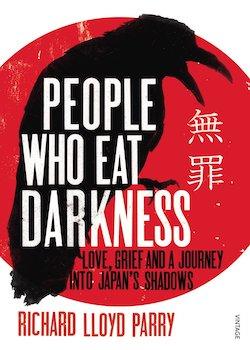People Who Eat Darkness

By Richard Lloyd Parry
Vintage, originally published February 2011 and republished February 2012 by Vintage
416 pages, ISBN 0099502550
Review by Michael Sullivan
In 1995 Richard Lloyd Parry became the Tokyo Correspondent for The Independent newspaper and he was in Japan when a news story broke in 2000 that a British girl was missing. In his book People Who Eat Darkness we get to see a new perspective of the events surrounding the disappearance and murder of Lucie Blackman as we follow his investigation into what had occurred to her. His research covers her family, her history, an overview of events from her disappearance up until the discovery of her body as well as an in-depth look into the most mysterious of people: Joji Obara.
Born in 1978 Lucie Blackman was 21 and had only been in Japan a short time when she disappeared. She had been working in Roppongi as a hostess and at first it wasn’t clear where she had gone, it appeared that she had gone on a ‘date’ with a client and subsequent messages that claimed to be from her stated that she had joined a cult. It soon became clear that this was just an attempt to mislead the police investigation. Eventually suspicion centred on Joji Obara, but despite repeated questioning he never admitted to any knowledge of what had happened to her. Even to this day he claims his innocence in regard to her death. The police would be in for an unwelcome surprise when during a search of his home they discovered a massive video collection which recorded the apparent rape of hundreds of unconscious women. On the 9th February 2001 Lucie’s remains were found just a few hundred metres from one of Obara’s properties.
This book attempts to redress the balance that so much attention has focused on Japan and Obara and bring back into the focus who Lucie was. Beyond Lucie we also learn about her family and see the pain they experienced throughout the years and beyond. As can be expected a lot of the book also covers the problems the family experienced with the Japanese police and officials, the intense interest investigative journalists took in the underworld of hostess bars and the difficulties of understanding Japan, such as the trial system. For example, normally in Japan a case only goes to trial once the criminal has confessed to their crime – in the case of Obara he has never admitted any guilt to anything.
Richard Lloyd Parry also attempts to shed some light into Obara and why he did what he did to so many women, unfortunately this mainly led into dead ends. Beyond a general background into his family history, originally from Korea, and his business activities there is tantalisingly little information about him. Seemingly without any close friends or associates, and with his family refusing to say anything, there are very few details that can be obtained about him. The one thing that is clear was that he believed he could do what he liked without suffering any consequences.
This meticulously researched book provides an interesting insight into Japan, but mainly it brings to the reader’s attention the story of a young girl who thought she was going to a safe country and disappeared. It charts the sheer heartbreak and pain her family had to go through, as well as the author’s involvement and torturous attempts to remain objective while having so much intimate contact with Lucie’s parents. Ultimately, we get no closer to understanding how someone like Obara could get away with what he did for so long, but we do gain a new understanding of Lucie Blackman and what her family sadly went through.

